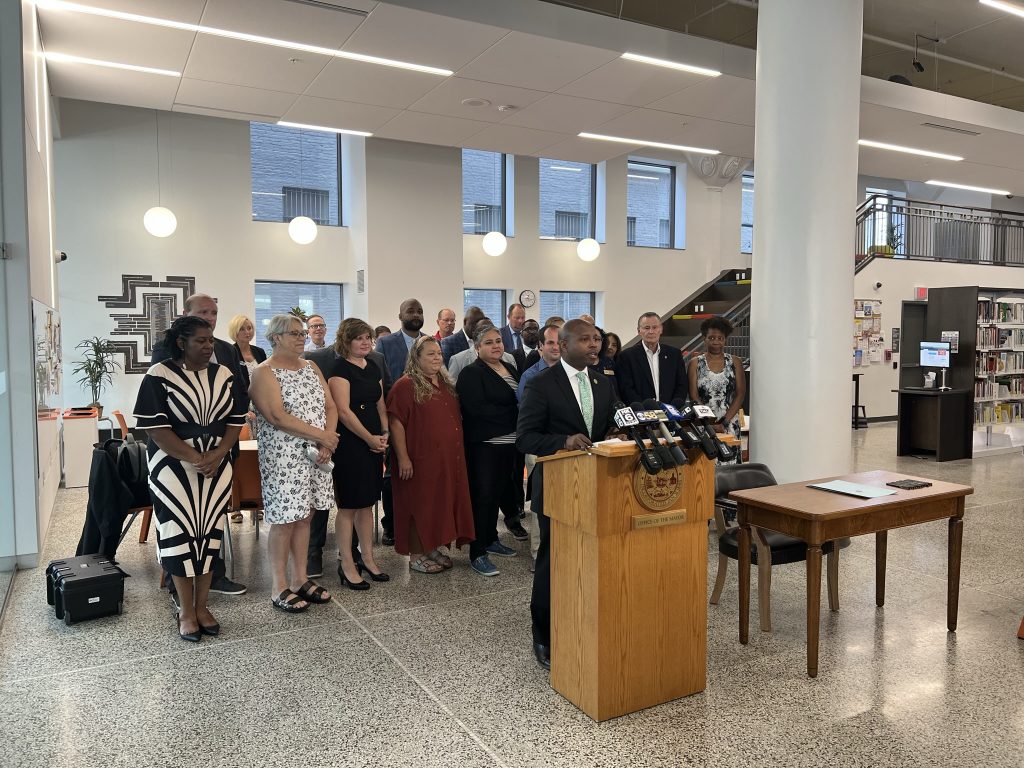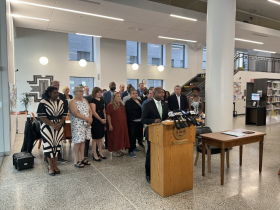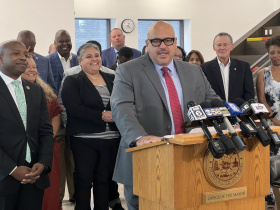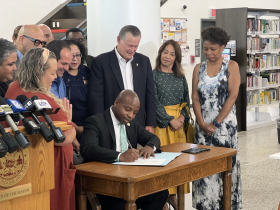Mayor Johnson Signs 2% Sales Tax Into Law
"Something huge, something major, something extraordinary," says Johnson of revenue deal, averting fiscal cliff.

Mayor Cavalier Johnson speaks before signing sales tax legislation into law. Photo by Jeramey Jannene.
It’s virtually unheard of for a politician to call a press conference to tout a tax increase, but that’s exactly what happened Friday.
Mayor Cavalier Johnson, with approximately two dozen people standing behind him, signed the city’s 2% sales tax increase into law. The new tax is expected to go into effect Jan. 1.
The cause for celebration was what would have happened had the Common Council not passed the tax earlier this week.
“Unimaginable cuts to the fire department. Unimaginable cuts to the police department, unavoidable cuts to our libraries,” said Johnson in an event held at the Mitchell Street Library, 906 W. Historic Mitchell St.
A June city budget office report says that, without the new funding, the city would need to eliminate 700 of its approximately 1,600 police officers, 250 of its approximately 700 firefighters and 400 general city employees.
The city’s budget, despite reductions in staffing, has been hampered for nearly two decades by state-imposed limits on new revenue sources and declining state aid. The city’s legal need to fully fund its pension system and the expiration of a pandemic-era federal grant set a 2025 fiscal cliff.
“From the outset, I knew that the only way forward required legislative change in Madison,” said Johnson, who had promised to get a “cot in the Capitol while on the campaign trail. He didn’t have to deliver on the promise, but has spent plenty of time working with Republican legislators to get the deal done. “There were stark differences of opinion, spirited debates and more than few late nights in the Capitol.”
Johnson, while noting Wisconsin’s sales tax doesn’t apply to groceries or prescription drugs, recognized that the result of the deal is that Milwaukee residents will pay more.
“I acknowledge that residents here in Milwaukee will contribute more to the city’s budget,” said the Mayor. “But for the first time, and this is really, really important, for the first time ever in Milwaukee, visitors, commuters, convention goers, tourists, they will start paying directly into the system for the services that they receive from the city.”
Johnson thanked many individuals for their support, including his onetime mayoral opponent Robert Donovan (now a Republican) representative for Greenfield) who stood by his side while he signed the legislation, Governor Tony Evers, Assembly Speaker Robin Vos, Senate Majority Leader Devin LeMahieu and those in attendance, including Sen. LaTonya Johnson, Rep. Christine Sinicki, Rep. Sylvia Ortiz-Velez and council members JoCasta Zamarripa, Lamont Westmoreland and Jonathan Brostoff.
But the mayor saved his great praise for Common Council President José G. Pérez. “[He] was a regular visitor to the State Capitol along with me. He joined me in public hearings and closed-door meetings. And, most importantly, he guided his colleagues on the Milwaukee Common Council to an affirmative vote on this,” said Johnson. He called the council’s vote one of the most important in its history.
“The word that comes to mind is relief,” said Pérez. “Relief that for the first time in years the city can prepare a budget without a dark shadow over it. But there’s frustration. Frustration that we were asked to tax our residents rather than be given a fair return for our region’s economic output. And there’s some anger, anger that this crisis was used as an opportunity to impose provisions that unfairly and unnecessarily reduce local control.”
But the council president said he is hopeful that this is a turning point for the city.
While the city has now cleared its largest hurdle, finding a revenue source to deal with the pension-triggered cliff, there are plenty of moving pieces that remain.
Independently elected Comptroller Aycha Sawa must certify the amount of revenue expected from the tax for its use in the 2024 budget. She said her office is working with the Wisconsin Department of Revenue on how they came to their $193.6 million estimate. “We’ve been analyzing their methodology,” she told Urban Milwaukee. A number of factors complicate the estimate, including that corporations with multiple locations, such as retailers, report their sales to the state at the county, not city, level.
The city also must initiate a “soft close” of its pension system, sending new employees to the state’s system while paying down the remaining costs on its system. The requirement to use state assumptions on lower rates of investment returns is expected to further increase the city’s pension costs, possibly by $50 million annually, in the coming years. The sales tax is to expire in 30 years or whenever the pension costs are retired, whichever comes first.
City officials will also need to be mindful of public safety spending requirements when crafting a budget. Cutting public safety spending or personnel levels could result in cuts to state shared revenue far greater than the extra $21.75 million shared revenue payment the city expects to receive next year.
That could result in the need to cut other areas of the city’s budget. “We’re looking at being in a really good position to fund the responsibilities that we have,” said Johnson when asked if the new funding was sufficient to avoid any cuts.
There are also potential legal challenges to the policy provisions buried in the law, known as Act 12. The city could sue over provisions that created diversity hiring and contracting prohibitions, strip the Fire & Police Commission of its policymaking authority and block the use of tax revenue for streetcar extensions. Both Johnson and Pérez have repeatedly said they opposed those provisions throughout the negotiating process.
The council passed other resolutions Tuesday related to pursuing federal grants for streetcar extensions, directing the City Attorney to explore legal challenges to policy provisions and directing city employees to work to repeal the policy restrictions placed in the bill. Johnson did not sign those resolutions Friday and said he is still reviewing them.
“We’ve accomplished something huge, something major, something extraordinary for our city,” said Johnson, maintaining an upbeat tone throughout his remarks.
The mayor signed the file using a different pen for each letter of his name, giving him plenty of keepsakes to hand out to supporters.
In addition to the elected officials, those standing behind him at the signing included Fire Chief Aaron Lipski, Library Director Joan Johnson, Budget Director Nik Kovac, VISIT Milwaukee CEO Peggy Williams-Smith, Milwaukee Police Association leader Andrew Wagner, Milwaukee Police Supervisors’ Organization leader Carmelo Patti, 2024 Republican National Convention host committee secretary Gerard Randall, library board chair and Journey House CEO Michele Bria, Community Development Grants Administration director Steve Mahan, Mexican Fiesta CEO Teresa Mercado, assistant police chief Nicole Waldner, and VISIT Milwaukee employee and Equal Rights Committee chair Tony Snell.
Milwaukee County, as part of Act 12, was also awarded a 0.4% sales tax, but has yet to adopt the measure.
If the county adopts its new tax, the sales tax rate within the City of Milwaukee would be 7.9%, 5% for the state, 0.9% for the county and 2% for the city. Select prepared food and beverage purchases in Milwaukee County are subject to an additional 0.5% tax that funds the Wisconsin Center District.
Photos
If you think stories like this are important, become a member of Urban Milwaukee and help support real, independent journalism. Plus you get some cool added benefits.
More about the Local Government Fiscal Crisis
- Mayor Johnson’s Budget Hikes Fees, Taxes In 2025, Maintains Services - Jeramey Jannene - Sep 24th, 2024
- New Milwaukee Sales Tax Collections Slow, But Comptroller Isn’t Panicking - Jeramey Jannene - Jun 28th, 2024
- Milwaukee’s Credit Rating Upgraded To A+ - Jeramey Jannene - May 13th, 2024
- City Hall: Sales Tax Helps Fire Department Add Paramedics, Fire Engine - Jeramey Jannene - Jan 8th, 2024
- New Study Analyzes Ways City, County Could Share Services, Save Money - Jeramey Jannene - Nov 17th, 2023
- New Third-Party Study Suggests How Milwaukee Could Save Millions - Jeramey Jannene - Nov 17th, 2023
- Murphy’s Law: How David Crowley Led on Sales Tax - Bruce Murphy - Aug 23rd, 2023
- MKE County: Supervisors Engage in the Great Sales Tax Debate - Graham Kilmer - Jul 28th, 2023
- MKE County: County Board Approves Sales Tax - Graham Kilmer - Jul 27th, 2023
- County Executive David Crowley Celebrates County Board Vote to Secure Fiscal Future and Preserve Critical Services for Most Vulnerable Residents - David Crowley - Jul 27th, 2023
Read more about Local Government Fiscal Crisis here
Political Contributions Tracker
Displaying political contributions between people mentioned in this story. Learn more.
- July 29, 2020 - Cavalier Johnson received $100 from Aycha Sawa
- June 3, 2019 - JoCasta Zamarripa received $100 from Christine Sinicki
- May 7, 2015 - Nik Kovac received $10 from Cavalier Johnson

























